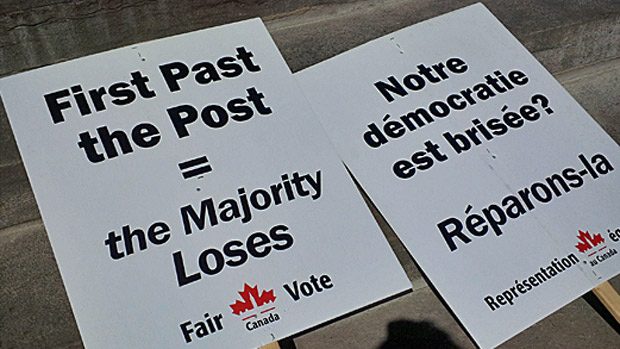As democratic institutions minister Maryam Monsef goes around the country on her "town hall" tour of electoral reform discussions, a pattern has emerged in that she is more interested in talking about reform "principles" than she is about actual voting systems themselves. This has sparked the ire of reform proponents who attend these functions, obviously keen to try and proselytize about their chosen electoral model, but it does make one wonder if Monsef wants to focus on principles and values, then what is her endgame?
When this whole exercise began, Monsef laid out eight principles that she wanted people to think about in the discussion, and those eight got whittled down to five that were eventually published in her department's guidebook on hosting a discussion on electoral reform. Amidst a cursory overview of different systems on offer, and helpful hints about how to host discussions that include tips like bringing snacks and getting people to sit in a circle or to break out into smaller groups for some conversations, those five principles are listed as being:
- Restoring the effectiveness and legitimacy of voting by reducing distortions;
- Encouraging greater engagement including by underrepresented groups;
- Supporting accessibility and inclusiveness and avoiding undue complexity;
- Safeguarding the integrity of the voting process; and
- Preserving the accountability of local representation.
On top of the principles, the guide asks people to discuss how they could strengthen effectiveness or legitimacy of governments; if the reforms could foster "civility, cohesion and openness" in politics; whether they will enhance the sense that people can contribute to and influence politics; how they can ensure that Canadians trust election results; and if any reforms affect MPs' accountability to citizens.
All of these are sufficiently vague so as not to overtly favour any one system in particular, but it should be noted that no one system will actually meet all of them either. In fact, part of the problem, not only with the principles as laid out but also the discussion questions around them, is that they foster some of the civically illiterate notions that are currently plaguing people's understanding of our political and electoral systems, which is part of the existential problem around this whole electoral reform exercise in the first place.
To wit, the concern that there are "distortions" in how elections are decided that affect the "legitimacy" of a government are fabrications arising from the wrong-headed notion that general elections are a single event, when they are in fact 338 separate but simultaneous events. It treats the popular vote figure as though it were real and not a logical fallacy that arises from that wrong-headed notion, and cites the supposed "distortion" between the percentage of a vote that a party received versus the number of seats they won as a credible problem for the legitimacy of a government rather than a problem with the fundamental basic civics education in this country something that Monsef and her office should be spending more time on actually promoting rather than playing into myths and falsehoods.
The principles and the questions around them also treats the voting system itself as the problem around inclusion by underrepresented groups or with civility, and lends credence to some of the myths perpetuated by proportional representation advocates in particular. There is a certain amount of magical thinking that goes into these particular myths when the solutions tend to mean hard work on the parts of party volunteers and members to removing barriers to access at the ground level, particularly in things like nomination contests. Some of this is also reflective of issues that Elections Canada needs to do in order to better get the vote out among some of these communities, whether that means better communications tools in more than just the two official languages, or in voter outreach and education for new Canadians. As for civility and openness, there is this pernicious belief by reform advocates that different systems will force parties to cooperate more and we'll have a more harmonious Parliament as a result none of which is actually born out in the experiences of other countries, or even in our own during periods of minority governments.
Monsef's town halls also include questions on online voting and mandatory voting, but the fact that she has "safeguarding the integrity" of the system as an important principle should rule out online voting right out of the gate. There are no systems that can properly assure both security and integrity because without a paper trail, we can never be sure if the results are accurate or have been tampered with, not to mention that online voting undoes more than a century of work in ensuring that there is a secret ballot.
So just what is Monsef's goal in stubbornly keeping the focus on these values and principles rather than the mechanics of any proposed electoral systems? There are a few reasons, not the least of which is that it gives her the widest latitude of discretion without making any firm commitments to any one voting system as the discussions play out. Nothing in there will tie her hands when it comes to making a decision on which system that the government will prefer as their best option, whether that's ranked ballots or some form or mixed-member proportional representation. It also gives her the appearance of listening to people's perceived grievances with the system as it exists, even playing into them, but there is a danger to feeding those grievances, particularly when they are grounded in ignorance.
If there is a silver lining in this insistence on sticking to values and principles, it's that when the committee process comes back in a deadlock which it almost certainly will it does provide Monsef with an escape hatch where she can point to all of the ways in which the current system, as properly understood, fulfils those same principles. That would be the best of all possible outcomes, but I won't hold my breath.






